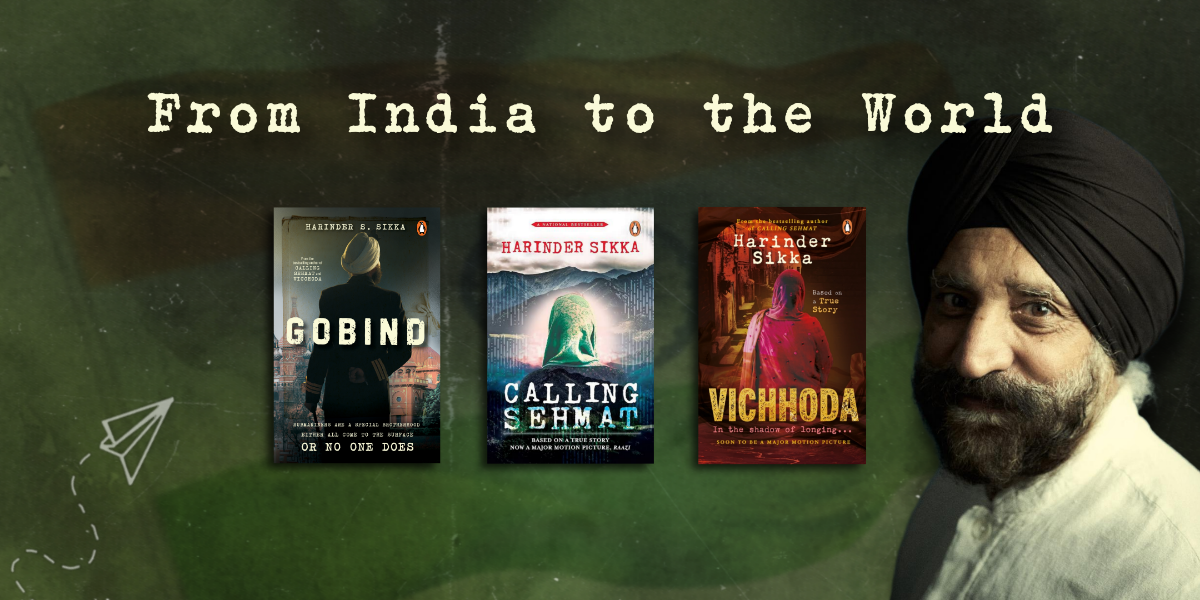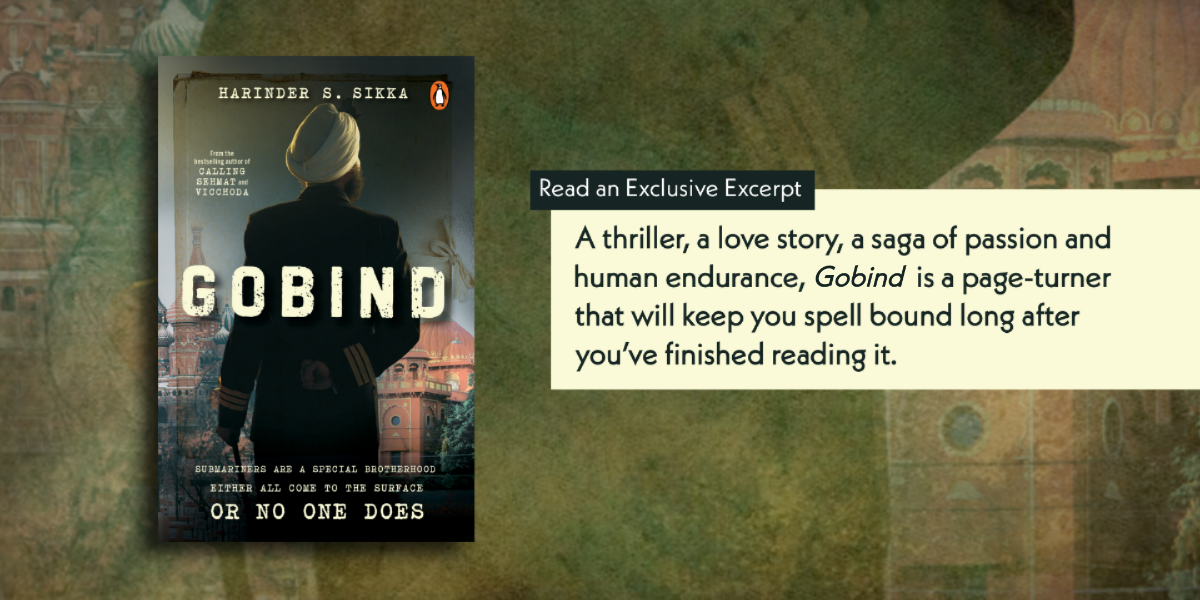It is in Harinder Sikka’s stories that ordinary people find themselves thrust into the most extraordinary circumstances and emerge victorious. The following three excerpts, each from his unputdownable bestsellers, showcase Mr Sikka’s masterful storytelling.
In Gobind, we meet a young man born into poverty, whose determination to rise above his circumstances leads him to join the Indian Navy. Yet, beneath his shining success lies the weight of unfulfilled promises and unrequited love. There are decisions he must make and promises he may have to break.
Vichhoda reveals the story of Bibi Amrit Kaur whose life is shattered by the violence of the 1947 riots, propelling her into a new existence in a foreign land. Despite the pain and loss she endures, her spirit remains unbroken!
Calling Sehmat, inspired by true events and adapted into the hit film Raazi starring Alia Bhatt, is the extraordinary journey of a young Kashmiri girl thrust into the world of espionage. Sehmat’s tale explores the sacrifices made in the name of patriotism and the indomitable courage of an unsung heroine.
Read the three excerpts below to discover more!

As the sun emerged from the distant horizon, the fields too began changing colour. The rapidly strengthening sun rays turned brighter with every passing minute, turning the dark and dense looking crops into a lush green landscape. Tiny golden-yellow flowers on top of the crops looked as if each plant had been knighted with a golden crown by mother nature. All kinds of birds emerged from their deep slumber and filled the atmosphere with a burst of chirpy sounds.
The entire village was soon bathed in different hues. Not to be left behind, the animals too began walking around their territories, marking, urinating on every pole, tree and bush. The farmers too began making a beeline on the snake-like thin track to their respective fields. Their farming tools hung from their shoulders like weapons saddled on the shoulders of soldiers enroute to the battlefield. Nature in its full glory was like a beacon of peace, love and tranquility all round.
Gargling and spitting the water out, Ranjit Singh accepted from his wife an old piece of cloth that was once a garment, re-stitched to serve as a face napkin. While handing it back to Amrita, he looked at her inquiringly, ‘Where’s Gobind?’
‘Oh, he has already left for the fields. Says he will come back in three hours and go to school afterwards,’ she replied.
The cloth napkin slipped out of Ranjit’s hand and fell on the wet floor between them.
‘Which fields?’ he asked, his face filled with shock and surprise.
‘To work in Bihari Lal’s field. Before leaving home, he told me that he wished to earn while he studied. I couldn’t stop him. He just left without discussing it further.’
Ranjit was speechless. His young, school-going teenage son had taken a decision to work part-time, without even consulting his father.
‘I don’t know what to make of all this. Working part time isn’t wrong. In fact, I am happy for this will inculcate discipline in him. But all of a sudden? I will ask Bihari ji what’s he up to.’
Amrita bent down to pick the cloth from the floor. Then, flapping it in the air repeatedly, she tried to remove the excess water it had absorbed from the wet floor and flung it on the clothesline to dry. She turned towards her husband and looked straight into his eyes. ‘Maybe we should leave him alone. Let him discover himself. He didn’t sleep well. He even sat up on the cot in the middle of night to say his prayers. He was unsettled last night after your stern talk. But he looked different this morning and very charged up when I met him, before he left quickly. There’s this visible change in him that I have never seen before. I am happy and worried.’
‘Prayer? Gobind? And how do you know he has changed?’ Ranjit’s face was now filled with confusion.
‘Because I am his mother.’
Ranjit’s eyes followed Amrita as she went inside the room. Then, wiping his hands on the cloth napkin that Amrita had just hung, he turned his attention outside. He lifted himself up on his toes and looked in the direction of the large haveli with vast green fields where his son was supposed to be working. His eyes scanned the horizon but couldn’t see Gobind. Turning back, he walked inside to find Amrita standing at the entrance, watching her husband.
‘Please stop worrying. You’ll get late for work. Get ready; I will get your breakfast. Your tiffin is also ready. Please don’t forget to take it along.’
Amrita’s affection-filled instructions relaxed Ranjit to some extent. Stepping into the room, he sat down on the floor while Amrita served him breakfast. It was the same food that he had eaten last night. He ate in silence. But his mind was racing in many directions while Amrita rotated the hand-held fan on its swivel. Before leaving home for work, he stood before the lord’s picture hung on the wall, joined his palms and murmured so softly that even his own ears couldn’t hear his own words.
‘With your permission, dear lord, I wish to go to work. It’s a new day, an amazing one at that. I want to thank you from the bottom of my heart. Only you, dear Guru Gobind, can help my son, Gobind.’
***

In 1950, after three years of Partition, the prime ministers of the two warring nations, Liaquat Ali Khan and Jawaharlal Nehru, signed a treaty which gave freedom to the women of both countries to return home. Bibi opted to stay back in Pakistan as her world revolved around her two beautiful children and doting husband. But destiny had something else in store for her. Even though Bibi had mostly confined herself to the four walls of her home, word of her mesmerizing and breathtaking sharp features had spread in the region. Given her marital status and the enormous respect her husband commanded, no one had dared cast an evil eye on her. Yet, there were men who never missed an opportunity to look at her discreetly and sigh lustfully.
Following the government’s directives, the station house officer (SHO) of the district issued orders to all villages, directing the women of Indian origin to confirm in writing their decision—live in Sadali as Pakistani citizens or return to India. Sakhiullah was away on a business tour for a few days. Bibi read the circular and signed the documents, confirming Muzaffarabad in Pakistan as her choice of residence. The havildar, who came to collect the document, was awestruck by Bibi’s beauty—her sharp but delicate features, porcelain skin and petite figure. He found it difficult to take his eyes off her and was filled with desire. Sensing his intention, she picked up her children and rushed inside. Her behaviour rebuffed him for the time being. However, the havildar couldn’t stop thinking about her. Back in the police station, he recounted the incident to his colleagues.
Unknown to the havildar, the SHO, Irfan Chaudhary, was eavesdropping on his poetic description of Bibi’s exquisite features. He was so intrigued by what he heard that he felt compelled to see her. The next day he drove all the way to Bibi’s home and knocked at her door. Bibi opened the door—her head covered, her nine-month old son resting in her lap. Their eyes met. He had not seen anyone quite as pretty, elegant and desirable as Bibi. Recovering somewhat, he managed to ask for her residential status. By now, Bibi had sensed something in his reaction as well. She responded uncomfortably, ‘My husband is coming home tonight. He will personally come to your office tomorrow and complete all the formalities.
The SHO smiled shamelessly, enjoying the many shades of pink that were appearing on Bibi’s face in quick succession. ‘No, no,’ he replied with an intention to extend the dialogue. ‘I don’t want to bother your husband. This is just a small formality, yet it must be completed at the earliest. There’s a police chowki in this village itself. You can come and sign the documents and be done with it. That will close the matter once and for all. Now that you are legally married to a Pakistani national and have two sons, the formalities won’t take much time,’ he added slyly.
Bibi was perplexed. She tried to think and then looked at the SHO’s face, who smiled hopefully and repeated, ‘It has to be done today, Bibi, otherwise I wouldn’t have troubled you. Please have mercy on me. There are many more homes to go to.’
Bibi couldn’t think of a suitable excuse. She had no choice but to go to the police chowki within the next hour. The SHO left, smiling cunningly.
Bibi hurriedly finished her daily chores and discussed the matter with the elderly women in her locality. Given the circumstances, she felt it was best to consult others as well. At their advice, she requested her next-door neighbour to babysit for her. However, another neighbour decided to accompany her to the police station. Bibi felt relieved that she wasn’t going alone. A local tonga was hired and the two burqa-clad women reached the police chowki, which was located on the outskirts of the village. To their surprise, they found a policeman eagerly waiting for Bibi’s arrival. However, seeing an elderly woman accompanying her, he stopped them at the entrance and went inside the small, makeshift chowki. They waited. A short while later, the policeman came out again. He walked towards the duo and asked the elderly lady to wait outside while he took Bibi inside to sign the papers
This seemed reasonable enough, so Bibi went in. She found the SHO sitting across a table—his eyes glued on Bibi, as if trying to pierce through the black veil. A bunch of papers and an inkpot with two wooden pens dipped in the holder were lying on the right side of the large wooden desk. Bibi sensed his intentions and grew uncomfortable. The SHO quickly removed one of the pens from the inkpot and placed it in front of Bibi. She hurriedly signed the documents without even reading them. Then she stood up in a hurry and was about to leave when the SHO rushed to the door and bolted it from inside.
Bibi,’ he said, looking at her lustfully. ‘What you have just signed is sufficient for me to send you back to Hindustan. It says that you’re not interested in living in Pakistan and would like to go back to your country. But if you do wish to live here, then spend the next hour with me . . . I’ll make sure you stay here with your sons and their father, or else . . .’ he looked straight at her. ‘It’s up to you. Decide quickly.’
***

Sehmat was the only child of Tejashwari Singh and Hidayat Khan, a successful and rich Kashmiri businessman settled in the Valley for many decades. Tej, as Tejashwari was fondly called, belonged to a rich Delhi-based Punjabi Hindu family.
Hidayat and Tej fell in love during her visit to Srinagar. On a cold winter afternoon Tej was walking around the serene surroundings of the Himalayan paradise and, on an impulse, entered one of the boutiques selling pashmina shawls. The beauty of the designs was such that they pulled her towards themselves and soon she was looking through the many that were displayed inside the shop. Tej was wondering what to take back to Delhi for her friends, when a pleasant voice drew her attention from behind.
‘May I help you?’
Turning around, Tej found herself looking into the light brown eyes of a stranger. He was tall, about an inch or two above six feet and wore an off-white Pathani suit. She was struck by his openness and simplicity.
Smiling, Tej asked him about the famed Kashmiri shawls on display. The man moved about the shop with a quiet authority, which made Tej believe that he was the owner of the sprawling emporium. After selecting a few delicately woven pashminas, Tej made for the cash counter to settle her bills.
‘Are you visiting Kashmir for the first time, Ma’am?’ His voice was now soft and inquiring.
She stopped to respond.
‘No, I have come here before and it is always peaceful and soothing,’ Tej replied, a slight smile playing on her lips. Wanting to hear more of his rich voice, Tej went on to tell him about her holiday and how she loved the Valley.
Conversation between the two flowed easily. Soon, they introduced themselves to each other. ‘I’m Hidayat,’ he said.
‘And I am Tejashwari. My friends call me Tej,’ she responded.
‘Can I call you Tej?’ he was quick to ask.
‘Please do,’ she replied, clutching her packet of shawls and moving towards the payment counter. She glanced at the bill, looked at it again, and then at Hidayat questioningly.
‘Can’t make profit from friends, can I? Hence the discount,’ he responded smiling.
Hesitantly, Tej paid the money, thanked her host and headed for the large door of the emporium. A slow warmth filled her heart as she walked out. Somewhere deep inside, she was surprised that a brief meeting with a complete stranger could arouse such strong feelings in her. With a sinking heart, Tej realized that this could be the last time she would see him or hear his alluring voice.
Hidayat stood at the door of his shop with a bemused expression on his face. He could not hold himself back.
He addressed her again, the door chime tinkling in the background. ‘Can we meet in the evening? I could take you to some interesting shops to select souvenirs to take back home.’
Tej found her voice caught in her throat.
So this was not the last time she would meet him?
Silently, she nodded. Her heart was wildly beating as she walked away. There was a strange excitement in her heart and a desire to meet him again. She walked some distance, then stopped and turned back to look at the boutique, only to find Hidayat still standing at the entrance, waving at her. She lifted her hand in acknowledgement and moved on. The melodious door chime was still ringing in her ears when she entered her hotel.
That evening, Hidayat rushed through his daily chores of balancing the shop accounts and locking up the emporium. He arrived at the hotel well before sundown and found Tej reading a magazine in the plush hotel lobby. That she was surprised to see him at the hotel was visible on her face. Knowing that her parents would not take kindly to a stranger taking their daughter on a guided tour, she hurriedly went up to him and asked him to wait while she convinced her parents about a short trip to the marketplace by herself. She was able to do that and in a few minutes Tej was back in the lobby, her face slightly flushed.
Slowly the two made their way to the marketplace. They took a leisurely walk around the lake, dodging tourists. Their slow-paced walk was often interrupted by locals who greeted Hidayat, some even asking him for his advice on investing in business and personal matters. It seemed strange to Tej that a man so young was so sought after by not only those his age, but by older people as well. Tej realized that Hidayat was not only respected but also loved by the folks in the city.
***
Get your copy of Gobind, Vichhoda, and Calling Sehmat by Harinder Sikka on Amazon or wherever books are sold.








